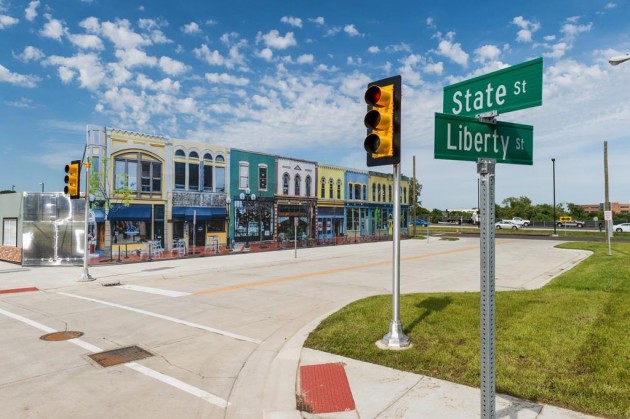
‘City’ for driverless cars opens in Michigan
by Canadian Manufacturing.com Staff

Technology could lead to safer roads, significant environmental benefits

Mcity street, complete with road signs and building facades. PHOTO: U-M Mobility Transformation Center
ANN ARBOR, Mich.—The University of Michigan has opened the world’s first controlled environment specifically for driverless cars. The facility, which has been dubbed “Mcity,” is designed to test the potential of connected and automated vehicle technologies that will lead to mass-market driverless cars.
“We believe that this transformation to connected and automated mobility will be a game changer for safety, for efficiency, for energy, and for accessibility,” Peter Sweatman, director of the University of Michigan Mobility Transformation Center, said in a statement. “Our cities will be much better to live in, our suburbs will be much better to live in. These technologies truly open the door to 21st century mobility.”
With high profile companies, such as Google and many of the major automakers beginning to test autonomous vehicles, the once sci-fi fantasy could quickly become a reality. Proponents often tout safety and efficiency as key advantages to going driverless, but if approached correctly using clean technologies, the environmental upside could be significant as well. For example, a 2013 Eno Centre for Transportation study found the technology could use more efficient braking, fine speed adjustments and better intersection management to reduce congestion, leading to fuel savings. Likewise, going driverless could increase how quickly electric vehicles are adopted as well, which would drastically reduce greenhouse gas emissions.
Mcity is a 32-acre mock-urban and suburban environment. It includes roads with intersections, traffic signs and signals, streetlights, sidewalks and construction obstacles. U-M said it is designed to support rigorous, repeatable testing of new technologies before they are tried out on public streets and highways. It was designed and developed by U-M’s interdisciplinary MTC, in partnership with the Michigan Department of Transportation and cost approximately US$10-million.
“There are many challenges ahead as automated vehicles are increasingly deployed on real roadways,” Sweatman said. “Mcity is a safe, controlled, and realistic environment where we are going to figure out how the incredible potential of connected and automated vehicles can be realized quickly, efficiently and safely.”